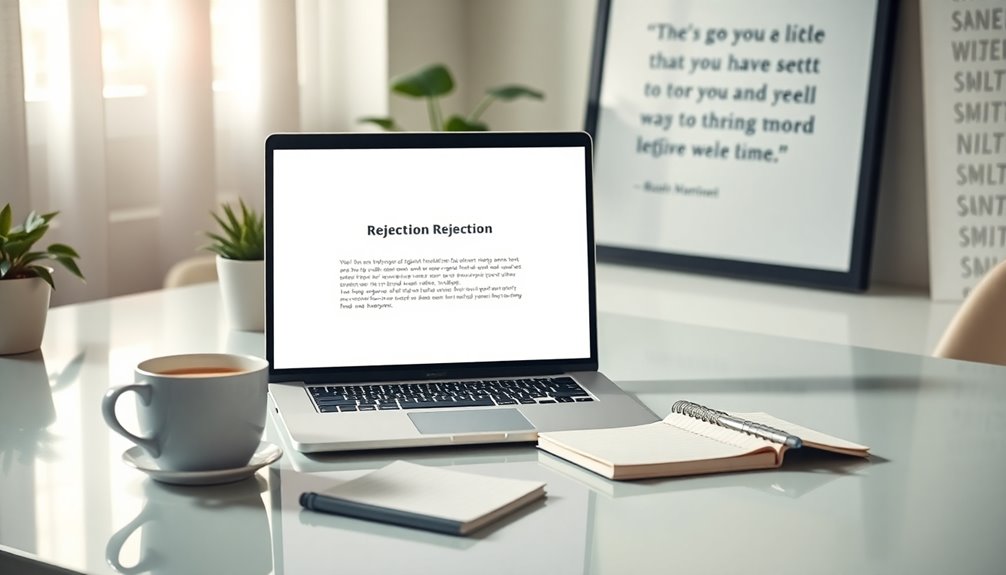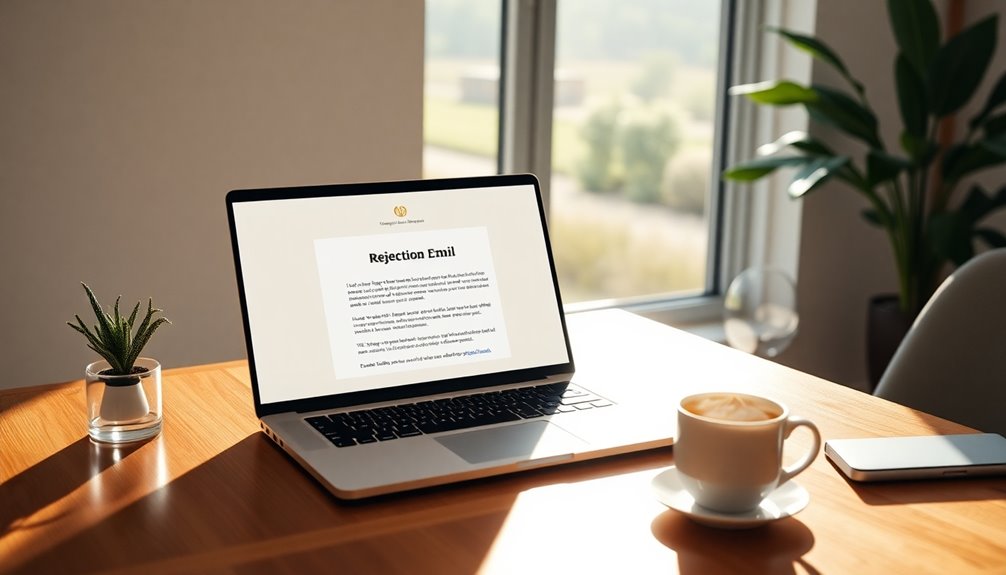When crafting a candidate rejection email, start by thanking them for their time and effort. Acknowledge the strengths they showed during the interview. Be clear but compassionate about the rejection, and offer constructive feedback to help them grow. Encourage them to apply for future opportunities, showing that you value their potential. Personalization is key; it makes them feel appreciated and respected. By doing this, you leave a lasting, positive impression and enhance your brand reputation. If you're looking for a structured template or more tips, there are plenty of useful insights ahead.
Key Takeaways
- Start with a heartfelt thank you for the candidate's time and effort during the interview process.
- Personalize the email by highlighting specific strengths observed in the candidate's interview.
- Provide constructive feedback to help candidates understand areas for improvement and growth.
- Encourage candidates to apply for future opportunities, reinforcing a positive relationship with the organization.
- Send the email promptly to respect the candidate's time and reduce uncertainty regarding the decision.
Introduction

When you have to deliver the disappointing news of a candidate's rejection, a well-crafted email can make all the difference. A candidate rejection email shouldn't just inform but also express gratitude for their time and effort during the interview process. Acknowledging their commitment enhances the overall candidate experience, leaving them with a positive impression of your organization.
To personalize the rejection email, reference specific strengths or notable moments from the interview. This approach makes candidates feel valued, even when they aren't selected. Including constructive feedback is essential; it provides candidates with insights that can help them in future applications and demonstrates that your company cares about their growth.
Moreover, encourage candidates to apply for future opportunities. By keeping the door open for potential talent, you maintain a positive relationship that can contribute to your employer branding.
A thoughtful rejection email can transform a disappointing experience into an opportunity for candidates to feel appreciated and motivated to engage with your organization again. Ultimately, crafting a considerate candidate rejection email fosters goodwill and can positively influence how candidates perceive your brand in the long run.
Enhances Candidate Relationship Management

A thoughtful rejection email not only conveys the decision but also plays a vital role in enhancing candidate relationship management. By sending personalized rejection emails, you acknowledge each candidate's unique contributions and express genuine appreciation for their efforts. This approach fosters a positive candidate experience, even when the outcome isn't what they hoped for.
Including constructive feedback in your rejection emails helps candidates identify areas for improvement, making them feel supported and valued. This encouragement can motivate them to reapply in the future, maintaining strong candidate relationships.
Moreover, timely communication of rejection decisions demonstrates respect for candidates' time, reinforcing your organization's commitment to positive engagement. Encouraging candidates to apply for future opportunities keeps the door open for talent re-engagement, ultimately strengthening your talent pipeline.
A well-crafted rejection email enhances your company reputation and brand image, as candidates are likely to share their positive experiences with their networks. This can attract more qualified applicants down the line. By prioritizing candidate engagement, you ensure that even those who didn't get the job leave with a favorable impression of your organization.
Empathy in Communication

How can empathy transform the experience of receiving a job rejection? When you prioritize empathy in communication, you create a positive candidate experience that resonates long after the interview. A personalized rejection email that acknowledges your efforts and strengths can significantly soften the blow of rejection. It shows that the employer values your emotional investment and respects your time.
Timely communication is essential; it demonstrates that the company cares about your feelings. When you receive a rejection promptly, it reinforces the notion that your candidate effort was appreciated. Including expressions of gratitude and offering constructive feedback in the rejection email positions the company as supportive and caring. This approach can turn a disappointing experience into goodwill, encouraging you to apply for future opportunities.
Moreover, research shows that candidates who experience empathetic rejection communications are more likely to share positive experiences. This not only enhances the employer brand reputation but also transforms rejected candidates into advocates for the organization.
Crafting Compassionate Rejection Emails

Crafting compassionate rejection emails is essential for fostering a positive candidate experience. Start by thanking candidates for their time and effort during the interview process. This simple gesture shows respect for candidates' time and acknowledges their commitment.
Personalizing rejection emails by referencing specific strengths observed during the interview can leave candidates feeling valued and appreciated. Incorporate constructive feedback to aid candidates in their professional growth. This not only helps them improve but also positions your company as a supportive and caring employer. Additionally, using effective communication strategies can further enhance the candidate's experience.
Make sure to send these emails promptly after a decision is made; this timely communication can significantly influence how candidates perceive your organization. Moreover, encourage future applications in your rejection emails. Letting candidates know they're welcome to apply for other roles keeps the door open for potential future hires and helps maintain positive relationships. Additionally, being aware of the importance of self-care can help candidates cope with the disappointment of rejection and focus on their next opportunities.
Pro Tips for Maximizing Impact

Maximizing the impact of rejection emails can transform a potentially negative experience into a constructive one. Start by personalizing your rejection email—include the candidate's name and mention specific highlights from their interview. This approach fosters a positive connection and encourages future applications.
Express your gratitude for their time and effort during the interview process. Acknowledging their commitment enhances the overall candidate experience and promotes goodwill toward your company.
Incorporate constructive feedback, even if it's brief. This helps candidates understand their strengths and areas for improvement, positioning your company as a supportive employer.
Furthermore, encourage candidates to apply for future openings. This reinforcement shows that rejection doesn't reflect their overall capabilities and keeps the door open for potential hires.
Common Mistakes to Avoid

Rejection emails can be a delicate communication, and avoiding common mistakes is essential to maintaining a positive candidate experience. One major pitfall is failing to personalize the email. Always address candidates by name and reference specific aspects of their interview to make them feel valued.
Additionally, sending rejection emails too late can leave candidates feeling ignored; timely communication is crucial in respecting their time and effort during the hiring process.
Another mistake is overloading the email with excessive praise before delivering the rejection. Be concise and direct about your decision to avoid mixed messages.
Not providing any constructive feedback can hinder candidates' growth; offering insights into their performance can help them improve for future opportunities.
Interview Follow-Up Email Template

An effective interview follow-up email serves as a key opportunity to express gratitude for the candidate's time and effort while clearly communicating your decision regarding their application.
Start with a warm thank you, acknowledging the candidate's contributions during the interview. This reinforces a positive candidate experience and sets a respectful tone.
Next, personalize the email by including the candidate's name and referencing specific moments from the interview. This enhances the emotional connection and shows that you value their unique qualities.
Clearly communicate your decision not to move forward, but do so with empathy to soften the impact of the rejection email.
If applicable, offer constructive feedback to provide valuable insights for the candidate's professional growth. This not only helps them improve but also demonstrates your commitment to their development.
Final Thoughts

Navigating the candidate rejection process doesn't have to be a daunting task. By using well-crafted rejection email templates, you can transform a potentially negative experience into a positive candidate experience.
Timely communication, ideally within a week of the interview, shows respect for the candidate's time and effort while enhancing your employer brand reputation. Additionally, understanding that state-specific benefits can impact candidates' perceptions helps in tailoring feedback effectively.
When you include personalized feedback, candidates gain insight into their skills and experience, helping them understand their strengths and areas for improvement. This thoughtful approach not only fosters a supportive impression but also encourages candidates to apply for future applications.
Always express gratitude by appreciating the candidate's interest and effort. A simple "thank you" can go a long way in leaving a lasting, positive impression.
Additionally, incorporating elements of unconditional love in your communication can help create a supportive atmosphere that resonates with candidates, making them feel valued regardless of the outcome. This, in turn, can motivate them to advocate for your company, even if they weren't selected.
Frequently Asked Questions
How Do You Email an Unsuccessful Candidate After an Interview?
When emailing an unsuccessful candidate, start with a personal greeting, clearly communicate the decision, acknowledge their strengths, encourage future applications, and offer constructive feedback. This approach maintains a respectful and positive relationship for potential opportunities.
How to Write a Rejection Email After an Interview?
When writing a rejection email after an interview, express gratitude for their time, highlight specific strengths, clearly state your decision, offer constructive feedback, and encourage future applications to keep the relationship positive and open.
How Do I Decline a Candidate After an Interview via Email?
To decline a candidate after an interview via email, express gratitude for their time, communicate your decision clearly, offer constructive feedback, and encourage future applications to maintain a positive relationship and respect their efforts.
How Do You Reject a Good Candidate After an Interview?
When you reject a good candidate after an interview, express gratitude for their time, highlight their strengths, clearly communicate your decision, provide constructive feedback, and encourage them to apply for future opportunities. Timeliness matters too.









